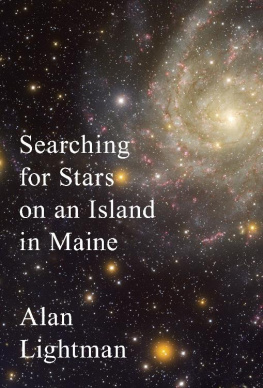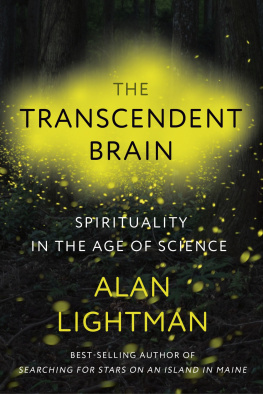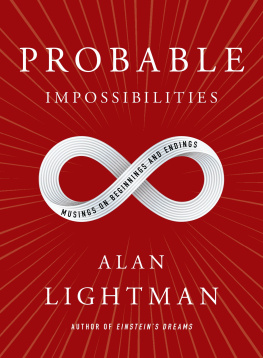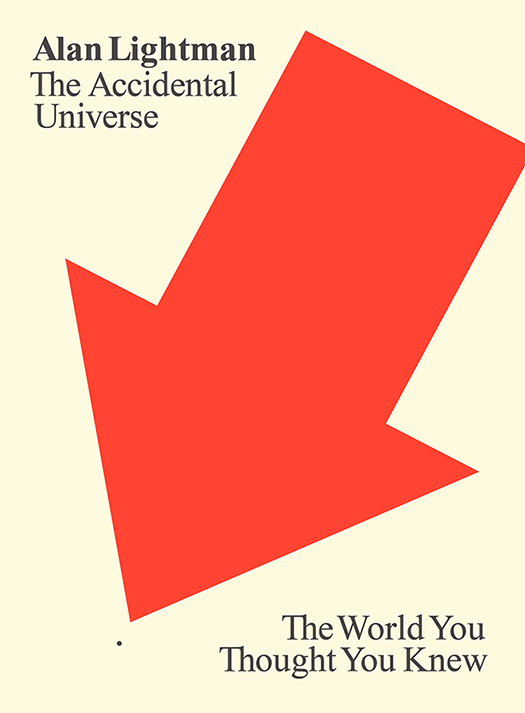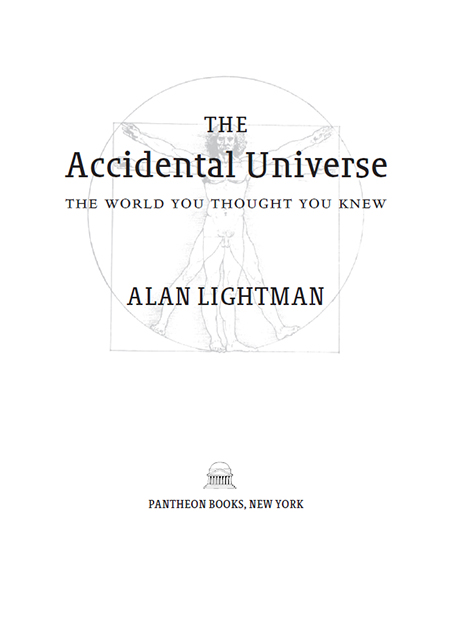Copyright 2013 by Alan Lightman
All rights reserved. Published in the United States by Pantheon Books, a division of Random House LLC, New York, and in Canada by Random House of Canada Limited, Toronto, Penguin Random House Companies. Originally published in the United Kingdom by Corsair, an imprint of Constable & Robinson, London, in 2013.
Pantheon Books and colophon are registered trademarks of Random House LLC.
Selected chapters in this work were previously published in the following: The Spiritual Universe, in Orion (March/April 2013).
Library of Congress Cataloging-in-Publication Data
Lightman, Alan P., [date]
The accidental universe : the world you thought you knew / Alan Lightman.
pages cm
Includes bibliographical references.
ISBN 978-0-307-90858-2
eBook ISBN: 978-0-307-90859-9
1. Cosmology. 2. Universe. 3. AstronomyPhilosophy. 4. PhysicsPhilosophy. 5. Intuition. 6. Instinct. 7. Thought and thinking. 8. Knowledge, Theory of. 9. Lightman, Alan P., [date] I. Title.
QB981.L55 2013 523.1dc23 2012047550
www.pantheonbooks.com
Jacket design by Pablo Delcn
v3.1
To my dear friends Sam Baker, Alan Brody, John Dermon, Hok Dy, Owen Gingerich, Micah Greenstein, Bob Jaffe, Peter Meszaros, Russ Robb, David Roe, Peter Stoicheff, and Jeff Wieand
CONTENTS
PREFACE
In October 2012, I attended a lecture given by the Dalai Lama in a cavernous auditorium at the Massachusetts Institute of Technology. Even without words, the moment would have been profound: one of the worlds spiritual leaders sitting cross-legged in a modern temple of science. Among other things, the Dalai Lama spoke about sunyata, translated as emptiness, a central concept in Tibetan Buddhism. According to this doctrine, objects in the physical universe are empty of inherent and independent existenceall meaning attached to them originates in constructions and thoughts in our minds. As a scientist, I firmly believe that atoms and molecules are real (even if mostly empty space) and exist independently of our minds. On the other hand, I have witnessed firsthand how distressed I become when I experience anger or jealousy or insult, all emotional states manufactured by my own mind. The mind is certainly its own cosmos. As Milton wrote in Paradise Lost, It [the mind] can make a heaven of hell or a hell of heaven. In our constant search for meaning in this baffling and temporary existence, trapped as we are within our three pounds of neurons, it is sometimes hard to tell what is real. We often invent what isnt there. Or ignore what is. We try to impose order, both in our minds and in our conceptions of external reality. We try to connect. We try to find truth. We dream and we hope. And underneath all of these strivings, we are haunted by the suspicion that what we see and understand of the world is only a tiny piece of the whole.
Modern science has certainly revealed a hidden cosmos not visible to our senses. For example, we now know that the universe is awash in colors of light that cannot be seen with the eye: radio waves and X-rays and more. When the first X-ray telescopes pointed skyward in the early 1970s, we were astonished to discover a whole zoo of astronomical objects previously invisible and unknown. We now know that time is not absolute, that the ticking rate of clocks varies with their relative speed. Such incongruities in the passage of time are unnoticeable to us at the ordinary speeds of our lives but have been confirmed by sensitive instruments. We now know that the instructions for making a human being, or any form of life, are encoded in a helix-shaped molecule found in each microscopic cell of our bodies. Science does not reveal the meaning of our existence, but it does draw back some of the veils.
The word universe comes from the Latin unus, meaning one, combined with versus, which is the past participle of vertere, meaning to turn. Thus the original and literal meaning of universe was everything turned into one. In the last couple of centuries, the word has been taken to mean the totality of physical reality. In my first essay, The Accidental Universe, I discuss the possibility that there may exist multiple universes, multiple space-time continuums, some with more than three dimensions. But even if there is only a single space-time continuum, a single universe, I would argue that there are many universes within our one universe, some visible and some not. Certainly there are many different vantage points. These essays explore some of the views, both the known and the unknown.
The Accidental Universe
In the fifth century BC, the philosopher Democritus proposed that all matter was made of tiny and indivisible atoms, which came in various sizes and texturessome hard and some soft, some smooth and some thorny. But the atoms themselves were accepted as givens, or first beginnings. In the nineteenth century, scientists discovered that the chemical properties of atoms repeat periodically, as in the so-called Periodic Table, but the origins of such patterns remained mysterious. It wasnt until the twentieth century that scientists learned that the properties of an atom are completely determined by the number and placement of its electrons, the subatomic particles that orbit the nucleus of the atom. These details, in turn, have been explained to high accuracy by modern physics. Finally, we now know that all atoms heavier than helium were created in the nuclear furnaces of stars.
The history of science can, in fact, be viewed as the recasting of phenomena that were once accepted as givens as phenomena that can now be understood in terms of fundamental causes and principles. One can add to the list of the fully explained: the hue of the sky, the orbits of planets, the angle of the wake of a boat moving through a lake, the six-sided patterns of snowflakes, the weight of a flying bustard, the temperature of boiling water, the size of raindrops, the circular shape of the sun. All of these phenomena and many more, once thought to have been fixed at the beginning of time or the result of random events thereafter, have ultimately been explained as necessary consequences of the fundamental laws of naturelaws found by us human beings.
This appealing and long trend in the history of science may be coming to an end. Dramatic developments in cosmological findings and thought have led some of the worlds premier physicists to propose that our universe is only one of an enormous number of universes, with wildly varying properties, and that some of the most basic features of our particular universe are mere accidentsrandom throws of the cosmic dice. In which case, there is no hope of ever explaining these features in terms of fundamental causes and principles.
It is perhaps impossible to say how far apart different universes may be, or whether they exist simultaneously in time. But, as predicted by new theories in physics, the many different universes almost certainly have very different properties. Some may have stars and galaxies like ours. Some may not. Some may be finite in size. Some may be infinite. Some may have five dimensions, or seventeen. Physicists call the totality of universes the multiverse, a word that sounds as if it came from a Robert Heinlein novel. Physicist Alan Guth, a pioneer in cosmological thought, says: The multiple universe idea severely limits our hopes to understand the world from fundamental principles. And the philosophical ethos of science is torn from its roots. As put to me recently by the Nobel Prizewinning physicist Steven Weinberg, a man as careful in his words as in his mathematical calculations: We now find ourselves at a historic fork in the road we travel to understand the laws of nature. If the multiverse idea is correct, the style of fundamental physics will be radically changed.


